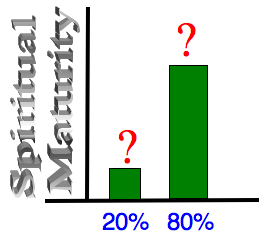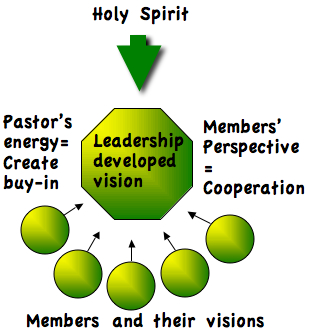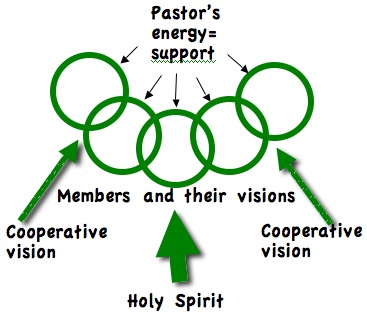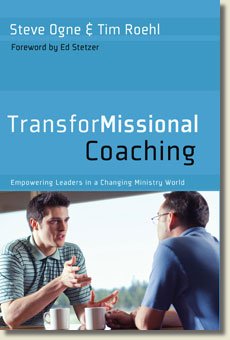see also The Pastor as Spiritual Coach (Part I)
From Programs to Contextualization
Who is to blame: the Congregation or the Leadership?
 In my responsibility of providing outreach and missions resources to churches, I have come across a curious phenomenon. My experience is that there are a number of people in church leadership who do not have a positive view of the spiritual maturity and commitment of their congregation. Comments such as “a mile wide and an inch deep,” “20% do 80% of the work,” “half an hour after the sermon is over they don’t remember it, let alone apply it,” “they don’t take advantage of opportunities to go deeper,” and “they don’t know their Bibles” have been expressed in my hearing. Why this is curious is that my experience with the people of God in our churches has given me quite the opposite opinion. I have been constantly impressed, motivated and encouraged by the level of spiritual maturity and commitment to Christ in the people I meet.
In my responsibility of providing outreach and missions resources to churches, I have come across a curious phenomenon. My experience is that there are a number of people in church leadership who do not have a positive view of the spiritual maturity and commitment of their congregation. Comments such as “a mile wide and an inch deep,” “20% do 80% of the work,” “half an hour after the sermon is over they don’t remember it, let alone apply it,” “they don’t take advantage of opportunities to go deeper,” and “they don’t know their Bibles” have been expressed in my hearing. Why this is curious is that my experience with the people of God in our churches has given me quite the opposite opinion. I have been constantly impressed, motivated and encouraged by the level of spiritual maturity and commitment to Christ in the people I meet.
 I have an uncomfortable suspicion that a significant part of this negative view of congregations stems from an inadequate approach to ministry by the leadership. The average church organization, whether labeled traditional, seeker sensitive or missional, has a leadership-driven program which members of the church are encouraged to support. The response by the congregation tends to be less than expected, especially if support has been indicated by a congregational vote.1 Priorities of attendance, giving and evangelistic participation are not at the level the leadership considers appropriate, and so the congregation is judged to be lacking in spiritual maturity. However, involvement in church organized activities is unlikely to prove to be a good measurement of spiritual maturity.
I have an uncomfortable suspicion that a significant part of this negative view of congregations stems from an inadequate approach to ministry by the leadership. The average church organization, whether labeled traditional, seeker sensitive or missional, has a leadership-driven program which members of the church are encouraged to support. The response by the congregation tends to be less than expected, especially if support has been indicated by a congregational vote.1 Priorities of attendance, giving and evangelistic participation are not at the level the leadership considers appropriate, and so the congregation is judged to be lacking in spiritual maturity. However, involvement in church organized activities is unlikely to prove to be a good measurement of spiritual maturity.
An alternate approach to ministry
 A couple of months ago, Karen and I proposed to our church an approach to ministry that focuses on the visions and desires of the individuals in the congregation. Rather than developing a church wide vision and unified program in which all are expected to participate, the pastor acts as spiritual coach to empower believers in their desire to become intentional and authentic followers of Christ within their day-to-day lives. Instead of encouraging people to “get involved in the church program,” the focus becomes “how can I be a support to you as you serve Jesus in your daily life?” The role of the spiritual coach is to help believers develop spiritually synergistic relationships with people both inside and outside of the church, as opposed to a posture of attending church events or participating in church programs. Instead of approaching people with the call to “join our team,” the pastor asks, “How can I be a part of your ministry?” I believe that such a change in focus would alter the perspective of pastors as they witness people’s concerns, prayers and struggles in their God given role of being salt and light.
A couple of months ago, Karen and I proposed to our church an approach to ministry that focuses on the visions and desires of the individuals in the congregation. Rather than developing a church wide vision and unified program in which all are expected to participate, the pastor acts as spiritual coach to empower believers in their desire to become intentional and authentic followers of Christ within their day-to-day lives. Instead of encouraging people to “get involved in the church program,” the focus becomes “how can I be a support to you as you serve Jesus in your daily life?” The role of the spiritual coach is to help believers develop spiritually synergistic relationships with people both inside and outside of the church, as opposed to a posture of attending church events or participating in church programs. Instead of approaching people with the call to “join our team,” the pastor asks, “How can I be a part of your ministry?” I believe that such a change in focus would alter the perspective of pastors as they witness people’s concerns, prayers and struggles in their God given role of being salt and light.
Organic Community
help them become more intentional Christians within their current life setting
There are a number of writers who view the church in a similar way. In his excellent book, Organic Community,2 Joseph Myers encourages leaders to make “the shift from programmer (master planner) to environmentalist (one who follows the principles of organic order to create and shape environments)” (34). Rather than adopting “models and programs that force prescriptive patterns onto our congregations, … [o]rganic order suggests there are many patterns we can use to connect to God and others.” (40-41). People are already living according to patterns and rhythms that make sense to them. Instead of calling them out of a context that defines their life so that they can serve in an organization driven program, it would be more satisfying and impacting to help them become more intentional Christians within their current life setting and relationships. Myers says, “[A] master plan tries to manufacture life, whereas organic order is an invitation to live.” (28) There is wisdom in encouraging church leadership to start where individual people live, and discover the ways that God is working in and through them. Synergy is created when people are encouraged and guided in the tasks they have initiated themselves, whereas pulling people into a centralized structure can result in frustration. In this organic dynamic, the scorecard is not attendance at events, but people’s stories. “Story is the measurement tool of community” (80). It is the narratives of those who have been impacted through their relationship with people in the church that measures the life of the community.
Another complaint I have come across from church leadership is that a major weakness of the congregation is that people are self-centered. The claim is that they come to church events with a clientele mentality looking to have their needs met. However, from my experience, I would agree with Myers that this perspective is a “misunderstanding that people generally operate from a position of ‘What’s in it for me?’” He further states that he does not find the presumption to be true, “Most people are not primarily selfish or self-serving.” When people are asked to participate in a project,
I do not see that people are asking, “What’s in it for me?” Instead, they want to know, “Why me?” This is not a self-serving question. It is a self-identifying, individual question.
People participate as individuals. They are interested in why they – specifically – are being asked. They want to know that you have chosen them first and foremost because of who they are, not to fulfill a strategic master plan.
‘Why me?’ comes from a deep desire to live beyond one’s self. A person wants to contribute in concrete ways, possibly in ways that only he or she could.” (62)
I believe that the reason many believers do not participate in the programs of their church is not that they are ignoring their responsibility, but because they are not convinced that those ministries are God’s calling for them. Imagine a ministry mentality that begins and ends with the dreams and visions of the individual members. Rather than searching for gifted people in the congregation to fulfill the needs of an overall church program, the focus is to create connections and provide support that guides believers to discover the calling of God in their lives.
Missional Renaissance
The reluctance of believers to serve church programs is not an indication that they are spiritual immature
Reggie McNeal has one helpful chapter in his book, Missional Renaissance,3 that deals with this congregation-focused orientation. He begins with a personal anecdote during his days as the leader of a programmatic church. One day he asked himself, “Are people better off for being a part of this church, or are they just tireder (sic) and poorer?” He realized that he did not know. He “could tell how busy people were with church but not how their lives were going” (89). In a major shift from this pattern of ministry, he calls leadership to recognize and conform their ministry to the fact that people do not want to fit their lives into the program of the church (96). The reluctance of believers to serve church programs is not an indication that they are spiritually immature or selfish. Instead, he claims that “God has created a cultural milieu where people are clamoring to grow…. [So] get out of the church business and into the people business.” (111). In praising one pastor who has changed from a program director to someone who empowers and releases the people in the congregation, McNeal says,
He plays the essential part of empowering leaders to pursue their callings and passions. He strengthens others’ obedience by creating a culture where they can say yes to the Spirit…. [All] the ministries he told me about happened away from the church. This same pastor went on to say, “I wouldn’t have a clue how to do what they do.” The very thought that clergy could preside over these kingdom expressions is ludicrous. Yet many congregational leaders do not trust people to minister out of their sight. (140)
Spiritual Coaching Description
Steve Ogne and Tim Roehl provide a good definition for the spiritual coaching of leaders that pastors can use to create the kind of environment that Myers and McNeal are promoting, “Coaches help people develop their God-given potential so that they grow personally and make a valuable contribution to the kingdom of God.” Ogne goes on to underscore the essential principles (with alterations to emphasize the application to the pastor as spiritual coach),
 “Coaches help people.” Coaching is a relationship…, not a program. It is focused on the [believer], not the program. You coach a [believer], not his or her ministry….
“Coaches help people.” Coaching is a relationship…, not a program. It is focused on the [believer], not the program. You coach a [believer], not his or her ministry….- “[D]evelop their God-given potential.” The potential comes from God, not the coach. A coach helps draw out the vision, values, gifts, calling, and passion God has already placed in the [believer].
- “[S]o that they grow personally.” Like mentoring, coaching is concerned with the personal (including … family), spiritual, and professional growth….
- “[M]ake a valuable contribution” Coaches help [believers] accomplish something for God. Coaches help [believers] identify and fulfill their specific calling and contribution.
- “[T]he kingdom of God. ” The kingdom of God is far greater than any one congregation…. [A pastor as spiritual coach will] ultimately equip individuals within their faith communities to engage and transform the culture as representatives of the kingdom of God.4
Spiritual Coaching as a means of Contextualization
The kind of thinking that promotes spiritual coaching resonates with missiological principles. The temptation of leaders is to take control of the ministry and make decisions that bring immediate results. Programs are implemented that exhibit characteristics the church leadership wants to promote in the church. The longer and more difficult road, which treats the people and environment being ministered to with respect, is to listen, discover and respond to the rhythms and networks that already exist as a natural part of people’s lives. This is an important application of the principle of contextualization, an essential methodology for the cross-cultural minister. A problem arises in the North American church sub-culture when this principle is ignored. Rather than altering the well-known traditional patterns of doing church to fit the ever changing rhythms of life of the community, the response of leadership can be to blame those who refuse to break their rhythms for the sake of a programmatic approach to ministry. But many believers are not being lazy or spiritually immature. Instead, they are seeking ways to bring Christ into their lives, rather than sacrificing activities that are fulfilling for the sake of a master plan that does not satisfy their spiritual hunger.
Mark spends part of his time coaching churches for evangelism and missions. If you would like to contact him please use the Contact Me form. If you would like to leave a comment, please use the “comment” link at the bottom of this article.
-
____________________
- 1 For a description of the 4 meanings of a “yes” vote see The Pastor as Spiritual Coach (part I).
- 2 Myers, J. 2007. Organic Community: creating a place where people naturally connect. Grand Rapids: Baker.
- 3 McNeal, R. 2009. Missional Renaissance: Changing the Scorecard for the Church. San Francisco: Jossey-Boss
- 4 Ogne, S. & Roehl, T. 2008. Transformissional Coaching: Empowering Leaders in a Changing Ministry World. Nashville: B&H Pub., pp. 26-27.

Lots of good stuff here. I have heard and said a lot of those comments regarding the state of our church members.
What I liked the most from this post was your reference to getting back in the people business. When we get to know someone on a personal level, we can help them integrate their faith and their calling into what they are already doing and into what God is doing in the world, desiring to make disciples of Christ. If they hate what they are doing, we can step along side them to help them change.
A good Christian resource to help individuals find their purpose and integrate it is Blueprint for Life (www.blueprintforlife.com). I teach this as a class at my church and am seeing good results from it.
Radical ideas Mark- sounds like the model proposed by the apostles! 😉